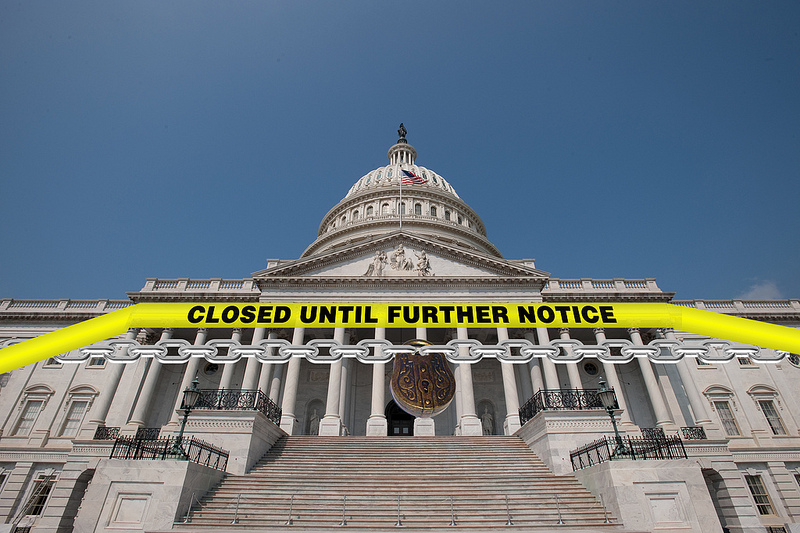On Monday night, the U.S. Congress rejected the U.S. Senate’s version of the House bill for a debt limit increase, which effectively shuts down some of the non-critical operations of the federal government.
The Republican-led House of Representatives, which has the primary right to produce financial and budget-related legislation, had extended the budget limit with add-on amendments, called “riders,” that included the postponement of the Affordable Care Act, as well as several other conditions. The Democratic-held Senate and President Obama had insisted on a “clean” bill that would only allow for continued government funding. Earlier in the day, the Senate had approved a version of the House bill, with the additional conditions removed.
Primarily, this will mean cuts to the the testing of some foods and drugs, closure of most national parks and monuments, and several science endeavors. It will not affect federal law enforcement or anti-terrorism functions. However, it may also affect businesses that rely upon foreign trade, travel and tourism.
It also will not affect active duty U.S. military members, as the Congress and Senate did agree to fund full operations and pay for the armed forces, which was signed into law by President Obama late on Monday evening. The President also offered a video, which will be aired to service members on Tuesday, that explains that their pay will not be affected regardless of the government “shutdown.”
Earlier on Monday, CPA Practice Advisor posted an article about the potential effects of a government shutdown on small businesses. While mostly government workers will feel the short-term effects, many private contractors and their employees will, as well.
Here are some examples of what a government shutdown could mean for America’s small businesses:
Taxes
- While the IRS would likely still be able to accept tax payments during a shutdown, some procedural changes to the submission process might be implemented. Small business owners should keep good records of their tax liabilities and be ready to react to possible temporary changes.
- Other filings may also fall by the wayside such as tax returns like the Forms 941 and 1099. In addition, the ability to negotiate tax abatements and other issues with the IRS would likely be delayed.
- For those small businesses just getting off the ground, they would potentially not be able to apply for an Employer Identification Number (EIN) for the purposes of paying taxes.
- Taxpayer and business tax audits would be suspended.
- IRS taxpayer services, such as toll-free assistance phone lines, would also be closed.
Employment Law
- While small businesses should continue to be aware of the recent increased enforcement activity from federal government agencies, they may see a temporary slowdown in regulatory scrutiny.
- Visa approval processes could also trickle to a stop, delaying the process of hiring employees outside of the country to work in the U.S.
General Implications
- Loans and other functions of the Small Business Administration intended to help spur small business growth could end for the duration of the shutdown.
- For small businesses that rely on revenue from federal government contracts, it may be time to do some belt tightening. Payments from federal contracts are likely to stop.
- Small businesses owners and employees who need to travel abroad on business may end up staying stateside as passport services will potentially come to a halt.
Thanks for reading CPA Practice Advisor!
Subscribe Already registered? Log In
Need more information? Read the FAQs
Tags: Income Taxes, IRS, Payroll




